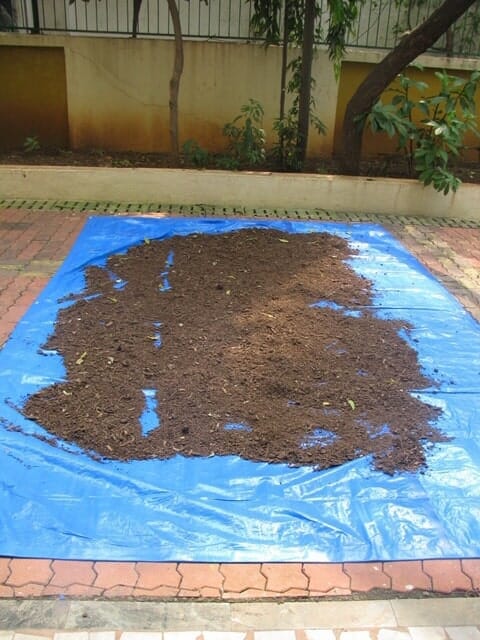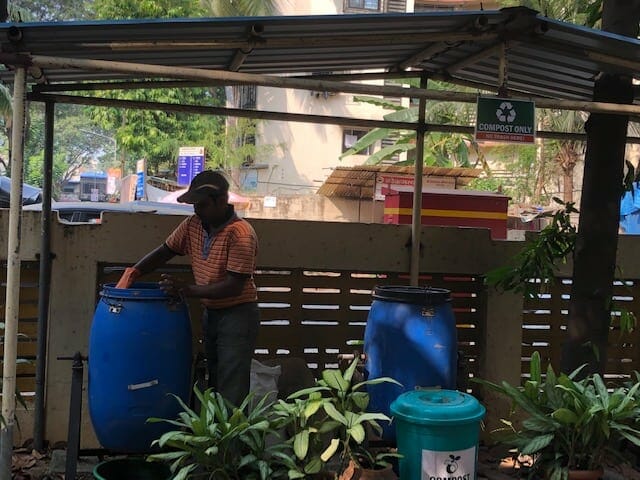According to an environment status report (ESR) released by the BMC for the year 2020-2021, 72.6% of the waste generated by residents is organic. A major chunk of this organic waste is taken to dumping grounds, which has caused recurring fires due to the high levels of methane gas it produces. Despite the BMC’s diktat to segregate wet waste at source, the implementation of it in buildings remains poor. Lack of incentives is considered to be the primary cause behind lack of focus on sustainable waste management.
Not all share the apathy, though. The “Zero Garbage Project” at Surabhi Housing Cooperative Society in Charkop, officially called the Charkop Atomic Energy Employees Co-operative Housing Society (CAEECHS), started as a community effort when I, along with a society member, Shama Nayak thought about composting the wet waste generated in our society. Since then, we have managed to reduce the total waste sent out from our society by almost 80%.
The task was daunting, but both of us took up the challenge as an important project not only for the building, but for the neighbourhood at large. This initiative by us led to the launch of the Zero Garbage Project at Surabhi in August 2017 after approval from the Committee Members.
Project highlights
Initially the society installed two composting tumblers of 100 ltr each, but now we have 5 tumblers in total, as more and more members are segregating their wet waste diligently.
The society has a dedicated employee who looks at all composting activities. Laxman’s job is to treat the wet waste as per the prescribed process and prepare it for composting on a daily basis. Once the compost is ready after 25 days, it needs to be dried for 2-3 days, sieved and then stored.

This entire process of composting has a monthly cost that includes the labour and material cost, which the society has been continuously taking care of for the past five years. The project team members have to constantly review the segregation for smooth functioning of the composting process.
Read more: Want to compost wet waste at home? Learn from this Mumbai couple
In case any issue is brought to the team’s notice, immediate feedback is given to the respective flat member, or a guidance meeting is arranged for all so that issues can be resolved quickly. It is worth noting that since August 2017, the composting project is continuously being run and monitored with enthusiastic support from all members.
Our society also got the compost tested at ITALABS, Mumbai and the report showed good ratings for the compost.
We have even voluntarily given the surplus compost to farmers as per the BMC’s Green initiative. Additionally, for the past two years, the society has regularly provided the compost to Mission Green Mumbai (Majhi Vasundhara Abhiyan).
Inspiration to others
Our committee has met with many citizens who have shown interest in knowing more about the project, some coming even from as far as Vasai. Many of the nearby society members have also come to see the project and tried to implement it in their society.
The society has been approached by the BMC Solid Waste Management (SWM) department on many occasions to register for Swachh Bharat Sarvekshan Competitions. Our project team members have always extended support to the BMC or other societies in the neighbourhood to raise awareness by conducting talks and visits to support the cause of proper waste management.

Property tax rebate
In August 2019, the BMC introduced a property tax rebate for housing societies that were undertaking waste segregation, composting, sewage treatment & rain water harvesting in their buildings. For those who were carrying out all three, a 15% rebate could be claimed on property tax. We have been engaged in waste segregation and composting, and hence we qualified for a 10% rebate.
We were delighted by the introduction of this scheme, as we wanted this support and acknowledgement from the BMC, so that more societies would take inspiration and be encouraged to take up waste management in their premises.
In October 2019, we started to further segregate the dry waste into hard plastic/soft plastic/e-waste etc. Plastic was given to Bisleri, to make bottles and e-waste to Ecoreco, an e-waste recycling company.
At present the society is segregating the dry waste into hard plastic, soft plastic, metal, glass, e-waste, paper and is sending it to 5Rcycle foundation for recycling.
Surabhi society was one of the first societies to start composting in the Charkop area and when we started further segregation of waste, the project team members were all the more hopeful of securing the rebate in property tax. So, on January 1st 2020, the Surabhi – CAEECHS society submitted its application to the Assistant Engineer of SWM in their ward for a 10% rebate on Property Tax for Waste recycling and Wet waste composting.
Read more: Sanitation workers struggle to make a living during the lockdown
Approval of rebate only on paper
According to the guidelines of BMC, a committee was to be formed in every ward to periodically review the society’s adherence to the stated conditions for rebate. The society’s rebate status would depend on this committee’s report.
On 7th February, 2020 the BMC committee members came to review our society’s waste management process and the society was handed a letter stating that a 5% rebate had been cleared for the society for its composting initiative, for the month of February 2020 (even though we had applied for 10%). They also told us that similar reviews would be conducted every month and the rebate for each month would be decided based on the review, and the final rebate amount would reflect in the year-end bill.
To date, the rebate has not been accounted for in our year-end bill. There was no repeat visit either by anyone.
Other experiences
At another society, the Whispering Palms Society, waste coordinator Arathi Manay took charge of all the waste management affairs of the society. “BMC officials reached out to me with a link to the form to be filled, to apply for the rebate. To make it easier for other residents, I even shared a guide on how to apply for BMC officials to share with other buildings, as there were a lot of bugs on the government website,” says Arathi.
However, like many other societies, Whispering Palms hasn’t received the property tax rebate either.
To apply for the rebate, as Arathi points out in her guide, you have to document the daily waste generated in a register – dry, wet, e-waste – and then enter all the information into the website before the 5th of the following month.
A review committee of five people, who’re usually from Advance Locality Managements (ALMs) in the area or are well versed with waste management policies, will then visit your building to oversee operations every month. However, in the case of Surabhi Cooperative Society, we find that there was only one visit by officials.
If there are any new guidelines or further processes that the society needs to complete, it has not been communicated to us clearly. The project team members including the secretary and chairperson have expressed their disappointment with the sad state of affairs of what was considered to be a very good scheme by the BMC.
“The BMC should work on making the application process easier and remove any unnecessary hurdles. The rebate is supposed to motivate other people and societies to take up the initiative. We’d like to share our experience enthusiastically, but when these schemes don’t follow through with their promises, it’s disappointing. Others, who may be primarily motivated by the rebate scheme, stop waste management activities altogether,” said Valsala Nayak, Secretary of Surabhi Society.
We’re aware that the pandemic put a lot of pressure on the BMC. The entire property tax rebate scheme appears to have been halted due to the pandemic, and all the societies that applied for rebate and did their paperwork are still waiting for it to be implemented. But even now, after the city has slowly started opening up, we haven’t heard from BMC officials about any updates.
However, we still believe in our dream of a zero garbage society and continue to work for the cause as a torch bearer for a greener and cleaner Mumbai. Having said that, a little appreciation and recognition of the efforts from the BMC in the form of the tax rebate scheme, will go a long way in inspiring larger public participation.
Read Neha Wagh article on Waste composting. Have few queries:
1. Does the process causes a bad odour or stink?
2. Who are reliable Equipment supplier?